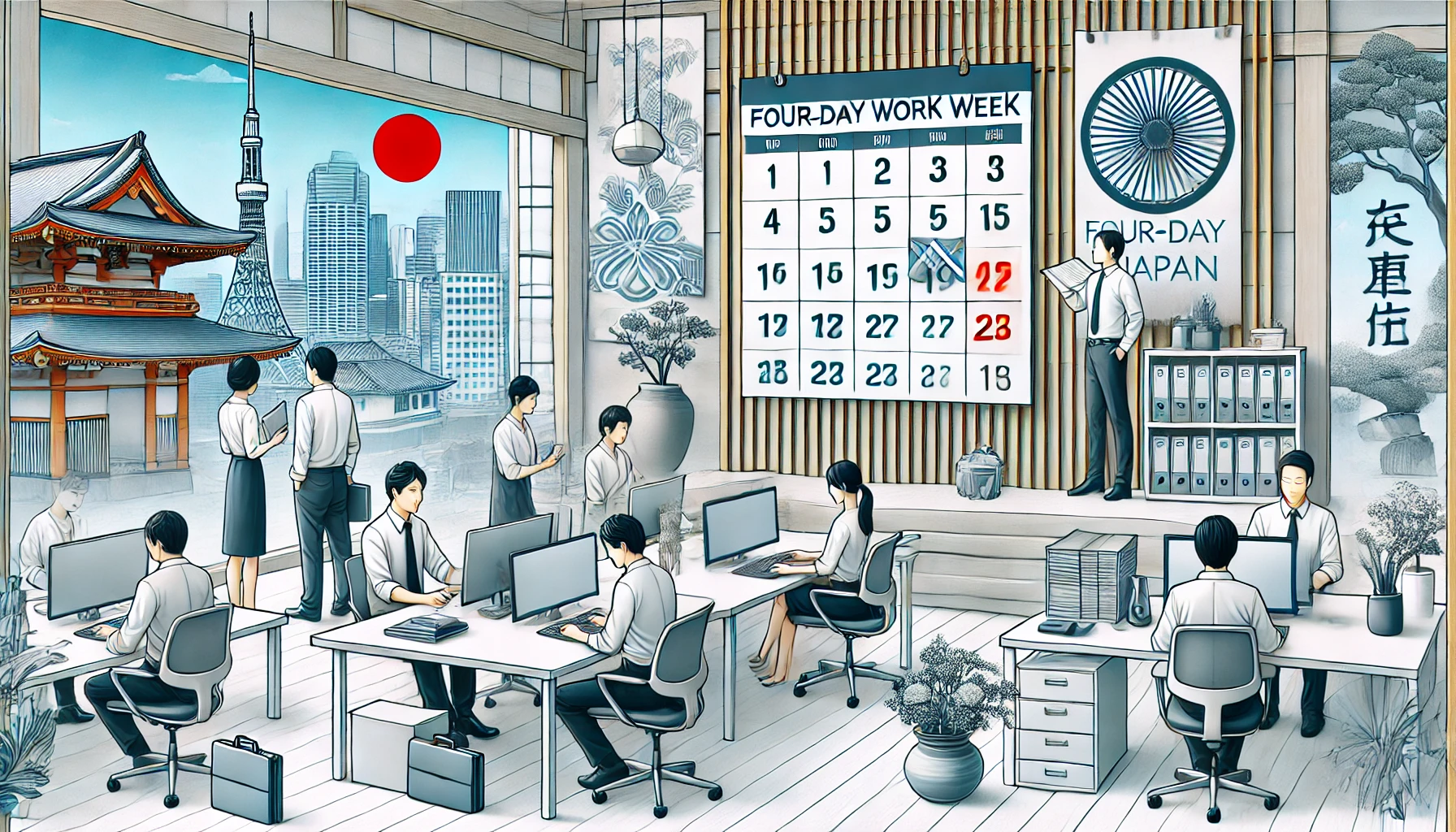Exploring the Four-Day Work Week in Japan: How Microsoft’s Experiment Boosted Productivity
The concept of a four-day work week has been gaining traction worldwide, with companies and governments exploring its potential to enhance productivity, improve work-life balance, and foster employee well-being. Japan, known for its demanding work culture, is one of the countries where this idea is being seriously considered. In this blog, we’ll delve into the four-day work week in Japan, examining how initiatives like Microsoft Japan’s experiment have sparked a broader conversation about work-life balance, productivity, and the future of work in the country.
Microsoft Japan’s Four-Day Work Week: A Surprising Productivity Boost
One of the most significant moments in the discussion about the four-day work week in Japan occurred in 2019 when Microsoft Japan conducted a bold experiment. The tech giant introduced the Microsoft Japan four-day week as part of its “Work-Life Choice Challenge,” giving its 2,300 employees Fridays off for an entire month. The results were astonishing: productivity jumped by nearly 40%.
Employees reported feeling more energized and focused, and the company observed a notable reduction in costs, including a 58.7% decrease in the number of pages printed and a 23.1% reduction in electricity usage. The success of this experiment demonstrated that a shorter work week could lead to more efficient use of time and resources, challenging the traditional notion that longer hours equate to greater productivity.
Japan’s Work-Life Balance: Shifting Cultural Norms
Despite the promising results from companies like Microsoft, adopting a four-day work week in Japan faces significant challenges rooted in the country’s deep-seated work culture. For decades, Japan has been synonymous with long working hours and a strong sense of loyalty to the company. This culture, known for its intense work ethic, has led to phenomena like “karoshi,” or death from overwork, highlighting the urgent need for reform.
The Japanese government has recognized this issue and is actively promoting work-life balance through various initiatives. Efforts to improve the Japan work-life balance include campaigns encouraging shorter working hours, more flexible schedules, and a reduction in overtime. However, the response has been mixed. While some companies have embraced these changes, others remain hesitant, fearing that reduced hours might harm productivity and competitiveness.
Challenges of the Four-Day Work Week in Japan: Cultural Resistance and Economic Concerns
Implementing a four-day work week in Japan is not without its challenges. One of the primary hurdles is the cultural resistance to change. Many Japanese workers and employers still equate long hours with dedication and success. This mindset makes it difficult for the idea of a shorter work week to gain widespread acceptance.
Moreover, there are concerns about the economic implications of such a shift. Critics argue that a four-day week productivity Japan might lead to reduced output and hinder economic growth, especially in a country that relies heavily on its workforce to drive its export-oriented economy. Additionally, there is the challenge of adjusting wages and benefits to reflect the reduced working hours without negatively impacting employees’ livelihoods.
However, proponents of the four-day work week believe that these challenges can be overcome. They argue that the potential benefits—such as improved employee well-being, higher job satisfaction, and a more sustainable work-life balance—could outweigh the drawbacks. Furthermore, as seen in the Microsoft Japan four-day week experiment, the potential for increased productivity might alleviate some of the economic concerns.
Government Policies and Labor Reforms: Paving the Way for Change
The Japanese government has been proactive in addressing the issue of work-life balance and the potential of a four-day work week in Japan. Through various Japan labor reforms, the government is encouraging companies to explore more flexible work arrangements. These reforms are part of a broader effort to modernize Japan’s labor market, which is crucial for addressing the challenges posed by an aging population and shrinking workforce.
Japan government workweek policy changes include offering financial incentives to companies that adopt shorter workweeks and providing guidelines on implementing such schedules effectively. These policies are designed to make it easier for companies to transition to a four-day work week while maintaining productivity and competitiveness.
Moreover, several Japanese companies adopting four-day work week policies have reported positive outcomes. For instance, companies in sectors such as technology, finance, and retail have started offering flexible work schedules, including four-day work weeks, to attract and retain talent. These companies have found that offering more flexible work arrangements can enhance employee satisfaction, reduce turnover, and improve overall performance.
Benefits of the Four-Day Work Week: A Win-Win for Employers and Employees?
The benefits of four-day work week policies are becoming increasingly apparent. For employees, the most obvious benefit is the additional day off, which can be used for rest, personal activities, or spending time with family. This improved work-life balance can lead to lower stress levels, better mental health, and increased job satisfaction.
For employers, the benefits include higher productivity, as employees are often more focused and efficient during their working hours. Additionally, offering a four-day work week can make a company more attractive to potential hires, especially in a competitive job market. It can also reduce operational costs, as seen in Microsoft Japan’s experiment, where the company saved on electricity and office supplies.
However, the challenges of four-day work week in Japan cannot be ignored. Employers must carefully consider how to structure workloads and manage expectations to ensure that productivity does not suffer. They must also address concerns about pay and benefits, as employees working fewer hours may expect corresponding adjustments in compensation.
The Future of the Four-Day Work Week in Japan
As Japan continues to grapple with the challenges of an aging population and a shrinking workforce, the four-day work week in Japan presents a potential solution to improve work-life balance and boost productivity. While there are significant cultural and economic hurdles to overcome, the success of initiatives like the Microsoft Japan four-day week suggests that this model could play a crucial role in shaping the future of work in Japan.
As more Japanese companies adopt four-day work week policies and the government continues to support labor reforms, the four-day work week could become more prevalent in Japan. This shift could not only enhance the quality of life for Japanese workers but also help the country maintain its economic competitiveness in a rapidly changing global landscape.
For more insights into labor reforms and work culture changes, visit Regent Studies, where you can explore educational resources on these topics.




